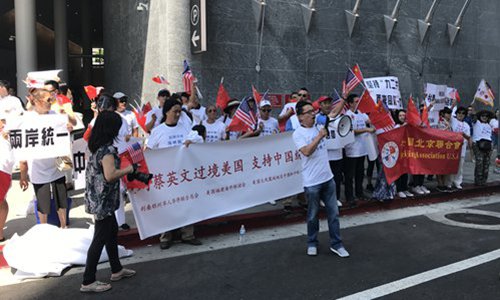Tsai's words don't match her deeds
Source:Global Times Published: 2020/5/20 15:27:11

Chinese demonstrators sing songs and chant slogans while waiting for the arrival of Taiwan leader Tsai Ing-wen in Los Angeles in August 2018. As Tsai arrived at the Intercontinental Hotel, she was greeted by peaceful Chinese demonstrators of all ages and from all walks of life. They were holding flags, banners and signs bearing the slogan "One China." The crowd began chanting "One China!" and "Oppose Taiwan Independence!" as Tsai pulled into the hotel. Photo: Wang Rujun
Editor's Note:
Taiwan leader Tsai Ing-wen gave her "inaugural speech" to start her second term on Wednesday.
In the part that concerns cross-Straits relations, she reiterated the words about "peace, parity, democracy, and dialogue" which she had mentioned in her election victory address on January 11. She also said Taiwan will not accept "the Beijing authorities' use of 'one country, two systems' to downgrade Taiwan and undermine the cross-strait status quo."
How to interpret Tsai's intentions regarding cross-Straits ties? How will cross-Straits relations evolve under Tsai's second term? The Global Times invited the opinion of two experts.
Zhang Hua, an associate research fellow at the Institute of Taiwan Studies, Chinese Academy of Social Sciences
First, the four words, "peace, parity, democracy, and dialogue", play a destructive role in cross-Straits relations. Obviously, Tsai holds a hostile mentality toward the mainland and stands by the US and its touted values in a move against the mainland.
She also failed to mention the four elements of the existing political foundations between the mainland and Taiwan, which she had previously mentioned in her 2016 inauguration speech. During her speech in 2016, she admitted the historic fact of the 1992 talks that set the tone for cross-Straits relations.
Now these are all gone. She did not give a response to the 1992 Consensus or the one-China principle. Rather, she only said she will handle the relations according to the relevant laws of Taiwan area and the Act Governing Relations between the People of the Taiwan Area and the Mainland Area. She said it in 2016 as well, but the experience of the past four years proves that the two laws are not enough to maintain a stable and peaceful relationship.
Another noticeable feature is that Tsai continues smearing the "one country, two systems" principle and shirking the responsibilities of maintaining cross-Straits peace. It is widely known that the foundation of cross-Straits peace and development lies in the 1992 Consensus. In fact, Tsai's rejection of the 1992 Consensus has led to turbulent cross-Straits ties. It is malicious to pass the buck to the mainland and lead public opinion astray.
In addition, Tsai said the relevant laws of Taiwan area will be adopted to deal with relations with the mainland on the one hand, but declared to establish a "constitutional" amendment committee. The mainland must be on high alert that Tsai authorities may use this chance to legitimatize "de jure independence."
Li Fei, a professor with the Taiwan Research Institute at Xiamen University
Judging from Tsai's statement on cross-Straits relations in her "inaugural speech," it's clear that she still dare not cross the bottom line of cross-Straits relations. On one hand, she evaded the 1992 consensus in her speech. This is in line with her previous stances. She also said Taiwan will continue to handle cross-Straits affairs according to the relevant laws of Taiwan area and the Act Governing Relations between the People of the Taiwan Area and the Mainland Area. Some forces in Taiwan were pushing to amend the Act Governing Relations between the People of the Taiwan Area and the Mainland Area, which indicates the cross-Straits relationship is one between two regions rather than two states. Tsai's statement shows that Taiwan dare not break the legal framework to seek independence.
Because of Tsai's refusal to acknowledge the 1992 consensus, the political basis of cross-Straits relations, the ties between the island of Taiwan and the mainland have reached a freezing point, dealing a heavy blow to economic and trade relations.
After all, the economy of Taiwan is highly dependent on the mainland. Tsai is pushing her New Southbound Policy, but it remains to be seen how effective this policy will be.
In the future, Taiwan will continue to follow a pro-US policy. It attempts to seek secession by riding the US' coattails and relying on US support. Such a delusional plan coincides with the US strategy to contain China, so Tsai's authorities feel encouraged.
Both the island of Taiwan and Washington are constantly touching Beijing's bottom-line, but neither of them dares to cross it. The Tsai authorities have become more emboldened to challenge the mainland because of the US support.
Washington is simply using Taiwan as a pawn to create troubles for the mainland. The chance that a war breaks out between the island of Taiwan and the mainland is much bigger than that between Beijing and Washington. If Taiwan crossed the mainland's bottom-line, the mainland will take military actions. How will the US react then? The US will be very cautious about whether it should militarily intervene in. The cost for a military intervention is too high for the US to afford - as can be seen from US' dealings with Iran.
Posted in: VIEWPOINT